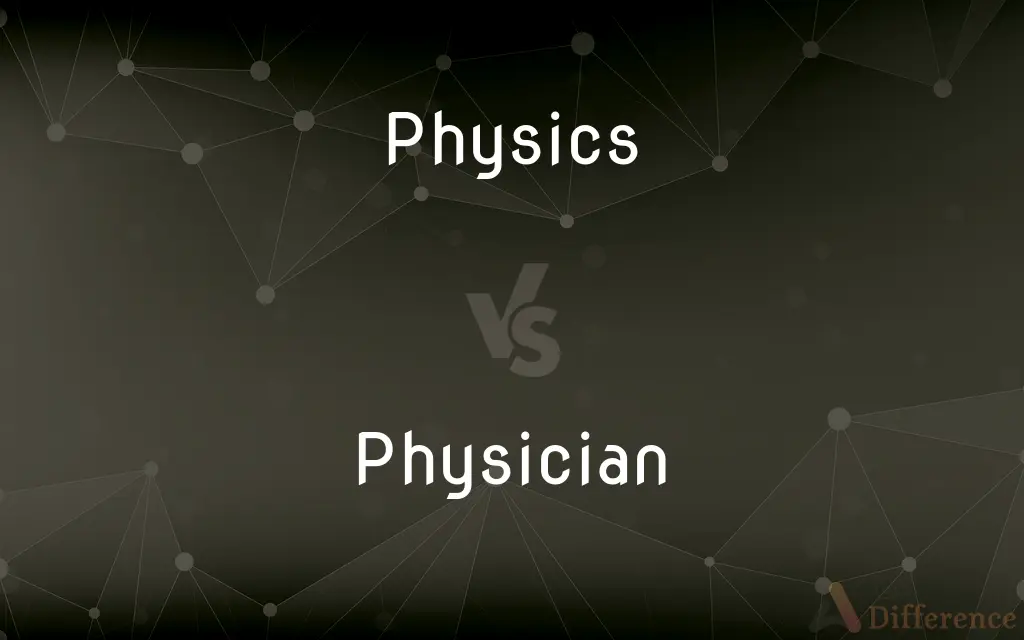Physics vs. Physician — What's the Difference?

Difference Between Physics and Physician
ADVERTISEMENT
Compare with Definitions
Physics
Physics (from Ancient Greek: φυσική (ἐπιστήμη), romanized: physikḗ (epistḗmē), lit. 'knowledge of nature', from φύσις phýsis 'nature') is the natural science that studies matter, its motion and behavior through space and time, and the related entities of energy and force. Physics is one of the most fundamental scientific disciplines, and its main goal is to understand how the universe behaves.Physics is one of the oldest academic disciplines and, through its inclusion of astronomy, perhaps the oldest.
Physician
A physician (American English), medical practitioner (Commonwealth English), medical doctor, or simply doctor, is a professional who practices medicine, which is concerned with promoting, maintaining or restoring health through the study, diagnosis, prognosis and treatment of disease, injury, and other physical and mental impairments. Physicians may focus their practice on certain disease categories, types of patients, and methods of treatment—known as specialities—or they may assume responsibility for the provision of continuing and comprehensive medical care to individuals, families, and communities—known as general practice.
Physics
(used with a sing. verb) The science of matter and energy and of interactions between the two, grouped in traditional fields such as acoustics, optics, mechanics, thermodynamics, and electromagnetism, as well as in modern extensions including quantum mechanics, relativity theory, cryogenics, solid-state physics, particle physics, and plasma physics.
Physician
A person trained and licensed to practice medicine; one who has a Doctor of Medicine or a Doctor of Osteopathic Medicine degree.
Physics
(used with a pl. verb) Physical properties, interactions, processes, or laws
The physics of supersonic flight.
ADVERTISEMENT
Physician
(Archaic) A person who practices general medicine as distinct from surgery.
Physics
(used with a sing. verb) Archaic The study of the natural or material world and phenomena; natural philosophy.
Physician
A person who heals or exerts a healing influence.
Physics
The branch of science concerned with the study of the properties and interactions of space, time, matter and energy.
Newtonian physics was extended by Einstein to explain the effects of travelling near the speed of light; quantum physics extends it to account for the behaviour of atoms.
Physician
A practitioner of physic, i.e. a specialist in internal medicine, especially as opposed to a surgeon; a practitioner who treats with medication rather than with surgery.
Physics
The physical aspects of a phenomenon or a system, especially those studied scientifically.
The physics of car crashes would not let Tom Cruise walk away like that.
Physician
A medical doctor trained in human medicine.
Physics
Plural of physic
Physician
A person skilled in physic, or the art of healing; one duty authorized to prescribe remedies for, and treat, diseases; a doctor of medicine.
Physics
The science of nature, or of natural objects; that branch of science which treats of the laws and properties of matter, and the forces acting upon it; especially, that department of natural science which treats of the causes (as gravitation, heat, light, magnetism, electricity, etc.) that modify the general properties of bodies; natural philosophy.
Physician
Hence, figuratively, one who ministers to moral diseases; as, a physician of the soul.
Physics
The science of matter and energy and their interactions
Physician
A licensed medical practitioner;
I felt so bad I went to see my doctor
Share Your Discovery

Previous Comparison
Typhoon vs. Tsunami
Next Comparison
Statue vs. Mannequin














































